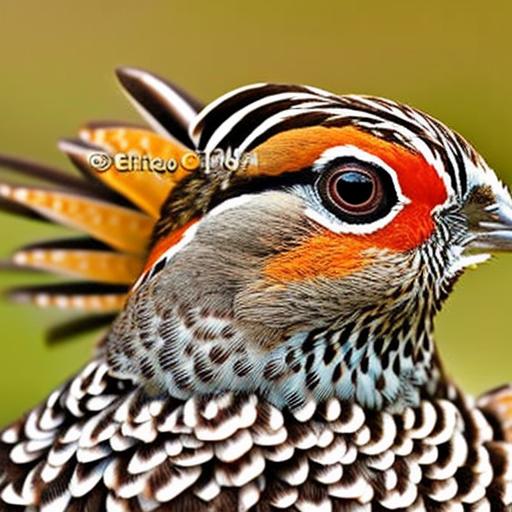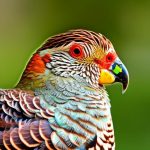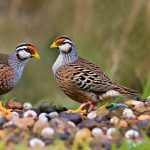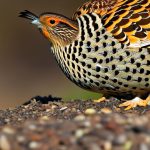Quails are small, ground-dwelling birds that make for unique and interesting pets. They are known for their gentle nature and social behavior, making them a popular choice for bird enthusiasts. Quails come in a variety of species, with the most common being the Japanese quail, also known as the Coturnix quail. These birds are relatively easy to care for and can be kept in small spaces, making them suitable for both urban and rural environments.
Quails are social animals and thrive in the company of other quails. They are known for their gentle and non-aggressive nature, making them suitable for keeping in groups. Quails are also relatively low-maintenance pets, requiring minimal grooming and attention. They are generally quiet birds, making them suitable for apartment living or areas with noise restrictions. Additionally, quails are known for their entertaining behaviors, such as dust bathing and foraging, which can provide hours of enjoyment for their owners.
Quails are also known for their egg-laying abilities, with hens capable of laying up to 300 eggs per year. This makes them a popular choice for those interested in raising their own eggs. Quail eggs are smaller than chicken eggs but are considered a delicacy in many cultures due to their rich flavor and high nutritional value. Overall, quails make for fascinating and rewarding pets for those willing to provide them with the proper care and environment.
Key Takeaways
- Quails are social birds that thrive in pairs or small groups, and they can make great pets for those with limited space.
- Quails require a secure enclosure with plenty of space to roam, as well as protection from predators and the elements.
- A balanced diet for quails includes a mix of commercial quail feed, fresh greens, and occasional treats like mealworms or fruits.
- Regular health check-ups and access to a qualified avian veterinarian are essential for keeping quails healthy and happy.
- Providing opportunities for social interaction and mental stimulation, such as dust baths and foraging activities, is crucial for the well-being of pet quails.
Housing and Enclosure for Quails
When it comes to housing and enclosure for quails, it’s important to provide them with a safe and comfortable environment that meets their specific needs. Quails are ground-dwelling birds that require ample space to move around and engage in natural behaviors such as dust bathing and foraging. A suitable enclosure for quails should be spacious, secure, and well-ventilated to ensure their health and well-being.
The ideal housing for quails is a large outdoor aviary or a spacious indoor enclosure with access to an outdoor run. The enclosure should be constructed with sturdy materials such as wire mesh to prevent predators from gaining access. It should also be equipped with perches, hiding spots, and areas for dust bathing to mimic their natural habitat. Additionally, the flooring of the enclosure should be covered with a soft bedding material such as straw or wood shavings to provide a comfortable surface for the quails to walk on.
Quails are sensitive to extreme temperatures, so it’s important to provide them with adequate shelter from the elements. In colder climates, a heated shelter or insulated enclosure may be necessary to keep the quails warm during the winter months. In warmer climates, providing shade and access to fresh water is essential to prevent heat stress. Overall, providing a spacious and secure enclosure with access to natural elements is crucial for the health and well-being of pet quails.
Feeding and Nutrition for Quails
Proper feeding and nutrition are essential for the health and well-being of pet quails. Quails are omnivorous birds that require a balanced diet consisting of high-quality feed, fresh fruits and vegetables, and access to grit for digestion. It’s important to provide quails with a varied diet that meets their specific nutritional needs to ensure their overall health and vitality.
A commercial game bird feed formulated specifically for quails is an ideal base diet for pet quails. This feed should contain a balanced mix of protein, vitamins, and minerals to support the quails’ growth and development. Additionally, offering fresh fruits and vegetables such as leafy greens, carrots, and berries can provide essential vitamins and antioxidants to supplement their diet.
Quails also require access to grit, which is small stones or sand that aids in the digestion of their food. Grit helps break down food in the gizzard, allowing the quails to extract nutrients more efficiently. It’s important to provide a separate container of grit in their enclosure at all times to ensure they have access to this essential dietary component.
In addition to their regular diet, quails also enjoy foraging for insects and small invertebrates. Providing opportunities for natural foraging behaviors can help keep the quails mentally stimulated and engaged. Overall, providing a balanced diet consisting of high-quality feed, fresh fruits and vegetables, and access to grit is essential for maintaining the health and vitality of pet quails.
Health and Veterinary Care for Quails
Maintaining the health and well-being of pet quails requires regular monitoring and preventive care. Quails are generally hardy birds but can be susceptible to certain health issues if not provided with proper care and attention. It’s important for quail owners to be familiar with common health concerns and to seek veterinary care when necessary to ensure the long-term health of their pets.
One common health issue in quails is respiratory infections, which can be caused by poor ventilation or exposure to drafts. Symptoms of respiratory infections in quails include sneezing, coughing, and difficulty breathing. To prevent respiratory issues, it’s important to provide a well-ventilated enclosure with clean bedding and regular cleaning to minimize dust and ammonia buildup.
Another common health concern in quails is egg binding, which occurs when a hen is unable to lay an egg due to various factors such as poor nutrition or stress. Symptoms of egg binding include lethargy, loss of appetite, and straining to lay eggs. If a quail is suspected of being egg bound, it’s important to seek veterinary care immediately to prevent further complications.
Regular veterinary check-ups are also important for monitoring the overall health of pet quails. A qualified avian veterinarian can provide guidance on preventive care, such as parasite control and vaccinations, as well as address any health concerns that may arise. By staying proactive about their health care needs, pet quails can live long and healthy lives under the care of responsible owners.
Socialization and Enrichment for Quails
Quails are social animals that thrive in the company of other quails. Providing opportunities for socialization and enrichment is essential for maintaining the mental and emotional well-being of pet quails. Socialization can help prevent boredom and loneliness while promoting natural behaviors such as grooming, preening, and vocalizations.
Quails should be kept in groups of at least three or more to prevent loneliness and social isolation. When introducing new quails to an existing group, it’s important to monitor their interactions closely to ensure they are getting along harmoniously. Providing ample space with multiple hiding spots and perches can help minimize aggression and territorial behavior among the quails.
Enrichment activities such as providing opportunities for natural foraging behaviors can help keep pet quails mentally stimulated and engaged. Scatter feeding or hiding treats throughout their enclosure can encourage natural behaviors such as pecking and scratching while providing mental stimulation. Additionally, offering toys such as hanging mirrors or puzzle feeders can provide entertainment and enrichment for pet quails.
Regular interaction with their owners can also provide socialization and enrichment for pet quails. Spending time near their enclosure, talking to them, or offering treats by hand can help build trust and strengthen the bond between quails and their owners. Overall, providing opportunities for socialization and enrichment is essential for promoting the overall well-being of pet quails.
Breeding and Reproduction of Quails
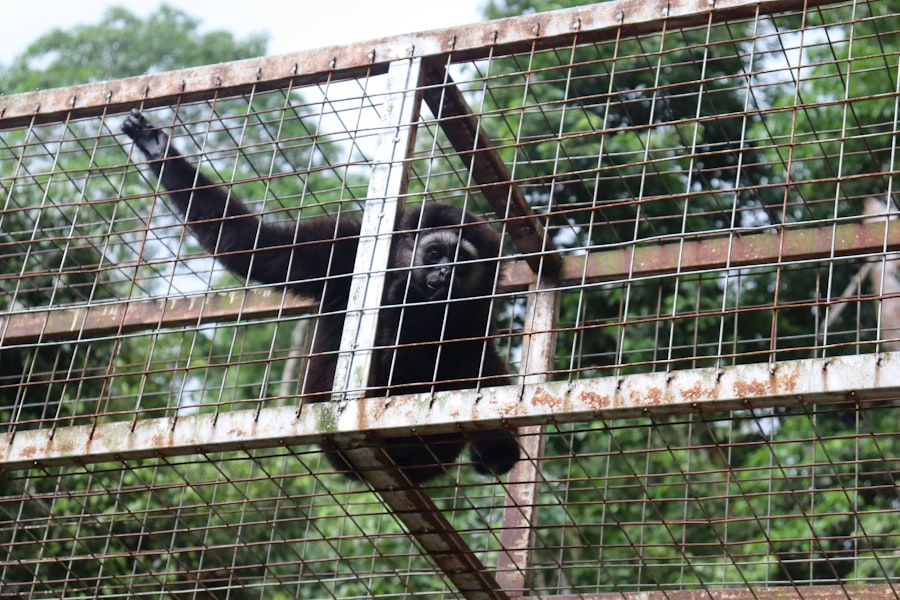
Quails are prolific breeders that can reproduce at a rapid rate under the right conditions. Breeding pet quails can be a rewarding experience for those interested in raising their own flock or producing eggs for consumption. Understanding the breeding behavior of quails and providing proper care during the breeding process is essential for successful reproduction.
Quail breeding typically occurs in the spring and summer months when daylight hours are longer. To encourage breeding behavior, it’s important to provide a suitable nesting area within their enclosure where hens can lay their eggs in privacy. A shallow tray filled with soft bedding material such as straw or wood shavings can serve as a suitable nesting area for the hens.
Once the eggs are laid, it’s important to provide proper incubation conditions if hatching is desired. Quail eggs require consistent warmth and humidity levels for successful incubation. Using a dedicated incubator or broody hen can help ensure optimal conditions for hatching. It’s important to monitor the temperature and humidity levels closely throughout the incubation period to maximize hatch rates.
After hatching, it’s important to provide proper care for the chicks to ensure their health and well-being. Chicks should be kept in a warm brooder with access to chick starter feed and fresh water. It’s important to monitor their growth and development closely during the early stages of life to ensure they are thriving under proper care.
Overall, understanding the breeding behavior of quails and providing proper care during the breeding process is essential for successful reproduction. By following best practices for breeding and reproduction, pet quail owners can experience the joy of raising their own flock while contributing to the conservation of these fascinating birds.
Common Mistakes to Avoid When Keeping Quails as Pets
While keeping quails as pets can be a rewarding experience, there are common mistakes that pet owners should avoid to ensure the health and well-being of their feathered friends. Understanding these common pitfalls can help prevent potential issues while providing optimal care for pet quails.
One common mistake is overcrowding quails in a small enclosure. Quails require ample space to move around freely and engage in natural behaviors such as dust bathing and foraging. Overcrowding can lead to stress, aggression, and an increased risk of disease transmission among the birds. It’s important to provide a spacious enclosure with plenty of room for all quails to thrive comfortably.
Another common mistake is neglecting proper nutrition and dietary needs. Quails require a balanced diet consisting of high-quality feed, fresh fruits and vegetables, and access to grit for digestion. Neglecting their nutritional needs can lead to health issues such as poor egg production or weakened immune systems. It’s important to provide a varied diet that meets their specific nutritional requirements.
Additionally, neglecting socialization and enrichment can lead to boredom and loneliness among pet quails. Quails are social animals that thrive in the company of other quails. It’s important to keep them in groups of three or more to prevent social isolation while providing opportunities for natural behaviors such as dust bathing, foraging, and vocalizations.
Finally, neglecting preventive veterinary care can lead to undetected health issues among pet quails. Regular veterinary check-ups are important for monitoring their overall health and addressing any potential concerns that may arise. By staying proactive about their health care needs, pet quail owners can help ensure the long-term health and vitality of their feathered companions.
In conclusion, keeping quails as pets can be a rewarding experience when provided with proper care, housing, nutrition, socialization, breeding management, veterinary care while avoiding common mistakes that may compromise their well-being.
In conclusion, keeping quails as pets can be a rewarding experience when provided with proper care, housing, nutrition, socialization, breeding management, and veterinary care while avoiding common mistakes that may compromise their well-being. It is important to create a suitable environment for quails, including a spacious and secure enclosure with access to fresh water and a balanced diet. Additionally, providing opportunities for social interaction and mental stimulation is crucial for their well-being. Proper breeding management and regular veterinary check-ups are also essential for maintaining the health of quails. By being attentive to these aspects of care, quail owners can ensure that their pets lead happy and healthy lives.
If you’re considering keeping quails as pets, you may also be interested in learning about the best coop options for chickens. Poultry Wizard offers a comprehensive guide on different types of chicken coops, including the best coop for chickens, farmhouse chicken coop, and A-frame chicken coop. Understanding the housing needs of poultry can provide valuable insights into creating a suitable environment for quails as well.
FAQs
What are quails?
Quails are small ground-dwelling birds that belong to the family Phasianidae. They are known for their distinctive calls and are often found in a variety of habitats, including grasslands, woodlands, and agricultural areas.
Can quails be kept as pets?
Yes, quails can be kept as pets. They are relatively low-maintenance and can be a great addition to a backyard or small farm.
What do quails eat?
Quails are omnivorous and their diet typically consists of a combination of seeds, grains, insects, and small invertebrates. They can also be fed commercial quail feed.
What kind of housing do quails need?
Quails require a secure and predator-proof enclosure that provides them with enough space to move around and access to fresh air and sunlight. The enclosure should also have a sheltered area for nesting and roosting.
Do quails need companionship?
Quails are social birds and generally do better when kept in small groups. It is recommended to keep at least a few quails together to provide them with companionship and reduce stress.
What are some common health issues for quails?
Common health issues for quails include respiratory infections, parasites, and injuries from predators or other birds. It is important to provide them with a clean and safe environment to minimize the risk of health problems.
Are quails noisy?
Quails are known for their distinctive calls, which can be quite loud, especially during the breeding season. However, compared to other birds, they are generally considered to be relatively quiet.
Can quails be trained?
Quails can be trained to some extent, especially when it comes to recognizing their feeding area and returning to their enclosure. However, they are not as easily trainable as some other pets.
Meet Walter, the feathered-friend fanatic of Florida! Nestled in the sunshine state, Walter struts through life with his feathered companions, clucking his way to happiness. With a coop that’s fancier than a five-star hotel, he’s the Don Juan of the chicken world. When he’s not teaching his hens to do the cha-cha, you’ll find him in a heated debate with his prized rooster, Sir Clucks-a-Lot. Walter’s poultry passion is no yolk; he’s the sunny-side-up guy you never knew you needed in your flock of friends!

